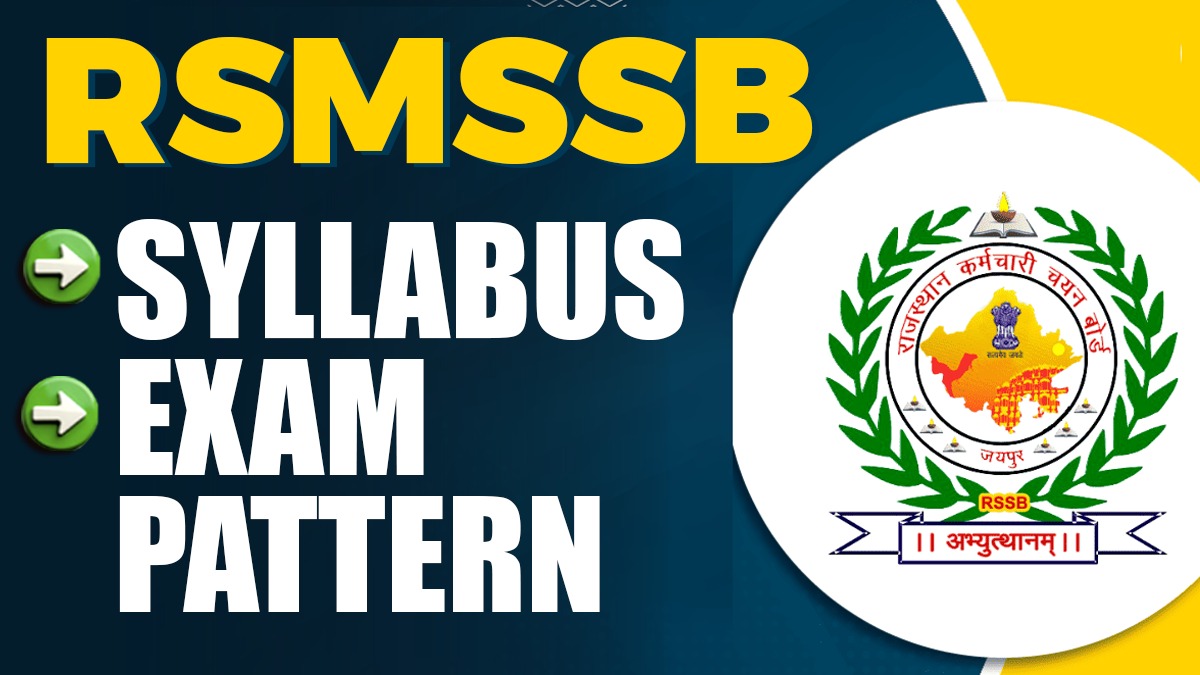The Rajasthan Subordinate and Ministerial Services Selection Board (RSMSSB) will soon release the syllabus and exam pattern for the NHM Rajasthan CHO (Community Health Officer) screening exam. Knowing the exam details, including the topics and structure, is important for candidates to prepare effectively.
RSMSSB Syllabus: Key Details
| Detail | Information |
|---|---|
| Exam Type | Objective-type Multiple Choice Questions (MCQs) |
| Total Questions | 100 |
| Marks Per Question | 4 marks |
| Total Marks | 400 marks |
| Negative Marking | 1 mark for every wrong answer |
| Exam Duration | 90 minutes |
| Selection Process | Written Test and Document Verification |
RSMSSB Exam Pattern Breakdown
The Rajasthan NHM CHO Exam Pattern consists of:
- Total Questions: 100
- Marks Per Question: 4
- Total Marks: 400
- Negative Marking: 1 mark deducted for each wrong answer
- Time Limit: 90 minutes
RSMSSB NHM Syllabus In Detail
The Rajasthan NHM CHO Syllabus covers a broad range of subjects, including General Awareness and key public health topics relevant to the role. Here’s a breakdown:
1. General Awareness
This section includes questions related to current affairs, important national and international events, and basic concepts in science, history, geography, and polity.
| Topic | Subtopics |
|---|---|
| General Knowledge | National and international news, events |
| Government Schemes | Policies and programs by government |
| Sports | Achievements and major sports events |
| Political Developments | Key political changes and updates |
| Economics | Financial news and economic issues |
| Geography | Geography of India and the world |
| History | Important historical events and figures |
| Polity | Indian Constitution and political structure |
| Environmental Issues | Major environmental concerns |
| Science & Technology | Updates in science and tech |
| Awards & Honors | National and international awards |
2. Concerned Subjects
This section focuses on public health, maternal and child health, nutrition, and other essential health management topics. Below are key areas covered:
| Topic | Subtopics |
|---|---|
| Basics of Human Body | Anatomy, body parts, functions |
| Public Health Concepts | Health planning, community health, sanitation, environmental health |
| Epidemiology | Epidemiological approaches, data interpretation, surveillance |
| Child Health | Neonatal care, immunization programs, child health issues |
| Family Planning | Methods, counseling, adolescent health, teenage pregnancy |
| Maternal Health | Antenatal, intranatal, and postpartum care, complications |
| Communicable Diseases | Vector-borne, infectious, zoonotic diseases, non-communicable diseases |
| Nutrition | Nutritional assessment, pregnancy, lactation, deficiency disorders |
| Health Management Skills | First aid, public health skills, medical emergencies, disaster management |
| Medical Conditions | Common diseases and conditions (GI, respiratory, heart, etc.), general medicine |
| Mental Health | Mental health issues, substance abuse, elderly care |
3. Skills-Based Subjects
These topics focus on developing skills to handle emergencies, public health situations, and patient care:
| Topic | Subtopics |
|---|---|
| Public Health Skills | Skills for managing public health emergencies |
| First Aid & Emergency Management | First aid for common conditions, trauma, burns, etc. |
| Maternal and Child Health Skills | Specific skills for reproductive and adolescent health |
| General Medicine | Common medical conditions and emergencies |
RSMSSB Exam Preparation Tips
- Understand the Syllabus: Focus on both general awareness and health-related topics.
- Time Management: Practice managing the 90-minute exam duration effectively.
- Practice MCQs: Given the objective nature of the exam, practicing multiple-choice questions will help improve accuracy and speed.
- Cover All Subtopics: Ensure that you cover every subject and sub-topic mentioned in the syllabus for a well-rounded preparation.

